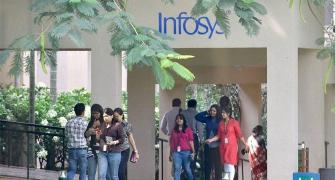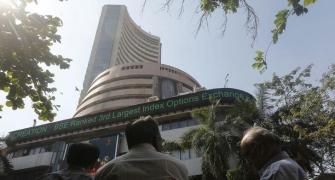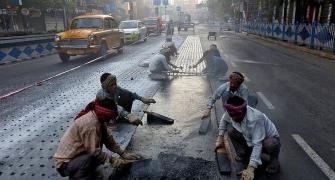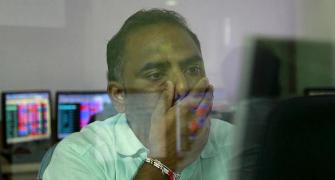Compare this with other global markets. The last time that the Dow Jones Industrial Average, which has a circuit filter mechanism on the index, halted trading was 12 years back on October 27, 1997.
The irony was evident on May 18 itself when trading was stopped on the NSE after the CNX Nifty gained 17.74 per cent, or 651 points. No such problem was faced by the SGX Nifty, the futures trading index listed on the Singapore stock exchange.
The index continued trading even after rising 20.75 per cent, or 765 points. The index circuit breakers kick in when there is a rise/fall of 10 per cent, 15 per cent and 20 per cent.
The London Stock Exchange (LSE) has no filters on overall indices although it follows a price monitoring system which is similar to filters on individual stocks.
In the LSE, there is automatic suspension of trading in a particular scrip for around five minutes if it is found that the stock price would move beyond its tolerance threshold (for example, more than five per cent from the price at the last trade) when the buy-sell orders are matched during automated trading. According to an LSE spokesman this allows the market time to review the situation and, if necessary, remove erroneous orders.
Some like the Australian, Hong Kong and Taiwan exchanges do not have any such mechanism.
One of the major reasons why circuit breakers (introduced in 2000) have become a common occurrence in India on individual scrips is the lack of depth in the equity market. "The Indian stock markets lack depth in terms of investors and free float," says Deven Choksey, managing director, K R Choksey Shares and Securities. That is, the promoter holding in most companies is as high 40 to 50 per cent or even more. And even the existing free float is largely cornered by institutions. So, it is quite easy to push prices up or down.
Among the CNX Nifty stocks (based on the value of holdings of the 50 NSE scrips), 55.09 per cent of holdings are with promoters, institutions have 26.23 per cent and retail investors have barely 15.42 per cent. And there are 26 companies, where promoter holdings are more than 55 per cent.
Added to this, the large volumes in the futures and options (F&O) market make matters worse. At present, there are 233 stocks in the futures and options (F&O) market. And all the Nifty and Sensex stocks are traded there.
Since the F&O stocks do not have any circuit filters and only margin payments are required, traders can aggressively take long or short positions. As a result, volumes in the F&O segment are five to ten times higher than the cash market. However, settlements have to be done in cash and not by delivering shares. Traders, therefore, have to come to the market to buy or sell to raise this cash and square their positions.
This act of buying and selling automatically impacts the prices in the spot market. In other words, higher positions in the F&O market leads to abnormal price movement in the spot market. This, coupled with the low float, creates a situation of high volatility and, consequently, circuits are broken quite often.
Analysts point out that circuit breakers have not been successful in arresting either the steep slides or gains. In many cases, operators resume their antics with a vengeance as soon as the stipulated time is over.
The road ahead
Experts are of the view that halting trading completely is not the best option even on days when circuit breakers are hit. R H Patil, former managing director of NSE, says one possible solution is to restrict further long trades for the day rather than shutting down the markets.
Others like M R Mayya, former executive director of BSE, suggest that markets should be closed for sometime, but not the entire day, since providing an entry and exit is important. He recalls the Harshad Mehta days when markets would rise and fall abnormally every day from June 1991 to February 1992. "But we did not shut the market for a single day. Instead we imposed tighter margins," says Mayya.
One way out is for exchanges to stop trading for 15-30 minutes when circuits are broken,. When trading is resumed, higher margins could be imposed on buyers (if the market hits the upper circuit) or sellers (if the markets hit the lower circuit). And depending on the gravity of the situation, margins could be as high as even 100 per cent. The idea is to stifle the rate of growth.
Ajay Shah, senior fellow, National Institute of Public Finance and Policy (NIPFP), has another formula: "It would be a better option to let the trades continue. I would advise something called 'call option' which was used earlier as a pre-opening option." In this system brokers were allowed to put in bids before the market opened. In a situation when trading is halted because of a circuit filter, the market was allowed to move into the 'call option' mode for 10-15 minutes. Traders could place buy and sell orders, but no actual trade would take place. This helped market participants to understand the trend when the market reopened.
The simplest way, many feel, is to get rid of filters on indices completely. In its place circuit filters should be imposed on individual scrips in the F&O segment. This would allow the cash to be deployed elsewhere when an index stock stops trading.
Another suggestion is to follow the Nasdaq way: Trading in a company scrip halts automatically to allow it to announce important news or when there is a significant order imbalance between buyers and sellers in a security. A trading delay (or 'delayed opening') is called if either of these situations occurs at the beginning of the trading day.







